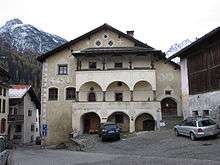Lower Engadine
The Lower Engadine (Romansh: Engiadina Bassa, German: Unterengadin) is part of the Engadine, traversed by the river En (German: Inn) and located at the most eastern part of Switzerland in the Canton Graubünden.

In contrast to the elevated plain of the Upper Engadine, where the upper reaches of the En flow gently down the valley, the geological background of the Lower Engadine forms a very different landscape. The right flank of the valley, the Lower Engadine Dolomites, is highly jagged, densely forested and steep. Glaciers and rivers have marked the left side of the valley in many different ways, where the geological structure has allowed for the formation of a fairly broad valley floor and sofly rising, rounded landscape features with high-lying terraces, which is where most of the villages - with the notable exception of the main town Scuol - are located.[1]
History
Tourism
History of tourism
In the Lower Engadine tourism became important in 1913 with the opening of the train station in Scuol, since then it has been well connected to the rest of Switzerland. In 1369 the mineral sources in Scuol were mentioned for the first time but the health benefits were known even earlier. The most important tourism attraction is the Bogn Engiadina Scuol inaugurated in 1993. Further, the opening of the Vereina tunnel in 1999 reduced the trip length from Zurich to Scuol considerably so now it is possible to do a one-day trip to Scuol, visit the Bogn Engiadina and return in the evening. With 80 km of courses, the inauguration of the Motta Naluns ski area in 1956 was another important date in the history of tourism in Scuol.
Local cuisine
The Lower Engadine cuisine has not lost its originality. This regional cuisine is characterized by the use of selected local spices which have the rare ability to infuse a dish with a certain Engadine taste. In general, the basic ingredients of the dishes are quite alimentary, using potatoes and meat because the Engadine farmers of former times had a hard daily working life. Additionally, expensive ingredients weren't available to the mainly poor farmers. Because of the local way of preparation, dishes vary from kitchen to kitchen and village to village.
References
- http://www.guarda.ch/index.php?lang=3&idcatside=95 Extract from : Guarda, Not Caviezel, © Schweizer Kunstführer, published by the Society for Swiss Art History
- Poltéra,Maggie. "Das Kochbuch aus Graubünden", Verlag Wolfgang Hölker GmbH 1979.
External links
- Engadin in Romansh, German, French and Italian in the online Historical Dictionary of Switzerland.
- www.scuol.ch
- www.engadin.ch
- Bundesamt für Naturschutz
- Bogn Engiadina
- www.hikr.org
- Engadine house - German